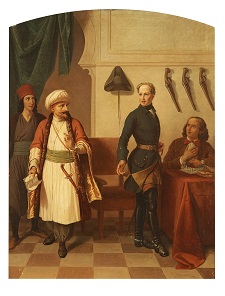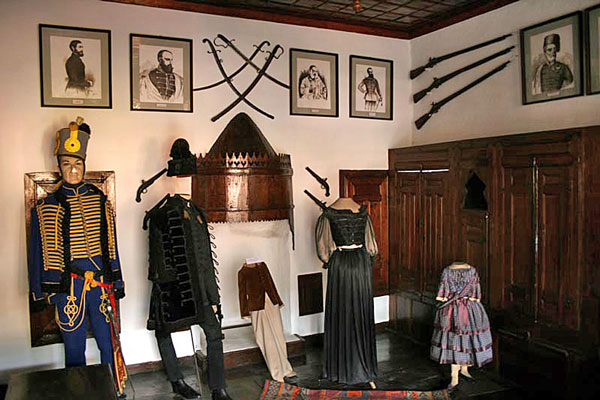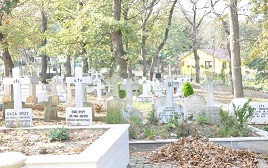(1).jpg)
TURKS NEVER HAND OVER THOSE WHO SEEK REFUGE WITH THEM!
The Ottoman land was once a sanctuary for those oppressed because of their beliefs, ethnicity, or traditions. For centuries, the Ottoman territories were a homeland where Muslims and non-Muslims lived in peace and security.
Whenever Muslims around the world wished to migrate to the Ottoman lands, which they regarded as dar al-Islam (lands ruled by Islam), the Ottoman government did not hesitate to open its doors. Upon the invasions of Crimea, the Balkans, and the Caucasus, Muslims from these regions migrated to Anatolia by sea or land. Thousands perished en route.
Those who managed to reach the motherland were settled in empty villages and towns. This massive wave of migration and asylum continued until shortly before the fall of the Iron Curtain.
.jpg)
It wasn’t just Muslims; individuals and communities among non-Muslims who faced discrimination due to their faith, race, or way of life in their own lands also sought refuge in the Ottoman Empire. They were welcomed warmly by Ottoman society, which possessed a culture vastly different from theirs. They were given the opportunity to continue their lives freely and fearlessly as they wished. In fact, the government granted these refugees citizenship without expecting anything in return.
This was because one of the principles of Ottoman culture, rooted in the Oghuz tradition, mandated serving guests regardless of their background and forbade handing over those who sought refuge to their enemies. For this reason, it was common for hosts to protect their guests by standing guard around their homes all night, armed. The Ottoman government even went so far as to engage in wars for this cause, as dictated by Islamic culture.
In the early 15th century, two rulers fleeing Timur (Tamerlane)— Qara Yusuf, the ruler of Azerbaijan, and Ahmad Jalayir, the ruler of Iraq—sought refuge with Ottoman Sultan Bayezid I. Timur demanded their extradition through a letter, but the sultan refused. This decision meant facing the world’s largest army in battle. Ultimately, the Sultan, who lived for honor, was defeated and lost his throne.
.jpg)
After being under Muslim rule for about eight centuries, Spain was conquered by Christians, and 250,000 Jews living there were forced to choose between baptism and death. Beginning in 1492, almost all of them sought asylum in Turkish lands. Ottoman ships made numerous voyages to transport them. They settled in prosperous port cities like Istanbul, Izmir, and Thessaloniki. For many years, Istanbul held the title of the city with the largest Jewish population in the world.
This was not the first instance of Jewish asylum. During Sultan Murad II’s reign, Jews expelled from France; Ashkenazi Jews expelled by the King of Bavaria in 1470; and Ashkenazis who survived massacres in Poland and Ukraine in 1660 also found refuge in Ottoman lands. Books on Jewish history openly state that the Ottoman Empire was the place where Jews most often sought asylum and lived comfortably when under pressure.
In 1547, Alqas Mirza, the brother of Shah Tahmasp of Iran, rebelled and was defeated. He, along with his entourage, sought refuge with Sultan Suleiman I. Despite being criticized for his policies toward Iran, the Sultan hosted Alqas Mirza and his entourage with high protocol in the Ottoman palace. When some Ottoman statesmen objected to this treatment, the Sultan responded, “We do whatever is required for the honor and dignity of the state.” During this reign, many refugees from Iran fled to the Ottoman Empire due to sectarian differences, and the state provided for their livelihoods.
The Unitarian Church, which rejected the Trinity, originated in Italy but was forced to flee to Eastern Europe due to pressure from other Christians. Prince Zsigmond of Transylvania, a vassal of the Ottoman Empire, also rejected the Trinity. For this reason, Christians opposed to the Trinity sought refuge and found a place to live here. In 1577, Sicilian monk Sozzini, who had written against the Trinity, fled to Kolozsvár (Klausenburg) in Transylvania.


Swedish King Charles XII, after being defeated by the Russians at Poltava, sought asylum in the Ottoman Empire. Between 1709 and 1714, he lived in the Ottoman European city of Bender. The Russian ambassador's demand for his immediate extradition was rejected. In fact, the Ottoman government entered into a war with Peter the Great of Russia over this issue.
Even after winning the war, the King could not return to his homeland. The Ottoman government covered all expenses for him and his 600-person entourage. He was also provided with assistance when he eventually returned to his country long after peace was established. Charles XII was nicknamed "Demirbaş," meaning "inventory," a reference to his long stay in Ottoman Bender, which was funded by the sultan's treasury.
After the 1848 revolutions, Hungarian and Polish revolutionaries, defeated in their struggle for independence, fled from Austria and Russia to the Ottoman Empire. Despite being placed in a critical political position, the Sublime Porte (the government of the Ottoman Empire) adamantly refused to extradite these refugees, no matter the cost.
This event was met with great admiration in freedom-loving countries like England and France. In London, young men even unhitched the horses from the Ottoman ambassador’s carriage and pulled it themselves in celebration.
Some of these refugees converted to Islam and entered Ottoman service. Among them were many prominent statesmen and soldiers. Polonezköy (Adampol), near Istanbul, was established at that time by Polish refugees who sought asylum in the Ottoman Empire.
On the same date, refugees also arrived from Italy.



The Russian Beard
In the 18th century, Tsar Peter I of Russia introduced a ban on beards, which provoked a strong reaction from the Russian people. This was because a beard was considered a symbol of being a good Orthodox Christian. However, the “Mad Tsar” was unyielding, even going so far as to kill his own son.
As a result, those unwilling to shave their beards were forced to leave Russia. Christian Cossacks who fled to the Ottoman Empire were settled in the town of Manyas in the Balıkesir province.
Similarly, the Molokans, who differed from Orthodox Russians in certain beliefs, such as drinking milk during fasting periods, also sought refuge in the Ottoman Empire. They settled in the border city of Kars. While many Cossacks and Molokans later returned to Russia upon invitations from the Russian government, their numbers were significantly smaller compared to the Christians who migrated from Russia to Anatolia.
In the 19th century, although Russia offered money and land to Christians migrating from Anatolia, the reverse migration was relatively insignificant in scale.
.jpg)
After the Russian Revolution of 1917, a civil war broke out between the Tsarist supporters and the Communists. When the Tsarist White Army lost the war, anti-communist Russians sought refuge in the Ottoman Empire, despite the dire circumstances of the war-stricken Ottoman state. Ships transported approximately 200,000 refugees between 1917 and 1921.
The White Russians were settled in Istanbul and Çanakkale, where they survived with the help of the Ottoman government, the Allied forces occupying Istanbul at the time, and the local civilian population.
Initially, they lived in refugee camps set up in vacant lots and squares, later moving into empty houses and buildings. They worked in minor jobs, and many eventually migrated to Europe and South America. Some, however, settled in Türkiye permanently.
A few years later, a communist leader, Leon Trotsky, was exiled by Stalin and sought asylum in Türkiye in 1929. He lived in Istanbul for a time.
.jpg)
Önceki Yazılar
-
IF TIME DOES NOT ADJUST TO YOU, THEN YOU ADJUST TO TIME!16.07.2025
-
THE OTTOMAN DYNASTY AND QURAYSH9.07.2025
-
"WOE TO THE ENEMIES OF THE REVOLUTION!" What Was The People’s Reaction To The Kemalist Revolutions?2.07.2025
-
DEATH IS CERTAIN, INHERITANCE IS LAWFUL!25.06.2025
-
THE SECRET OF THE OTTOMAN COAT OF ARMS18.06.2025
-
OMAR KHAYYAM: A POET OF WINE OR THE PRIDE OF SCIENCE?11.06.2025
-
CRYPTO JEWS IN TURKEY4.06.2025
-
A FALSE MESSIAH IN ANATOLIA28.05.2025
-
WAS SHAH ISMAIL A TURK?21.05.2025
-
THE COMMON PASSWORD OF MUSLIMS14.05.2025